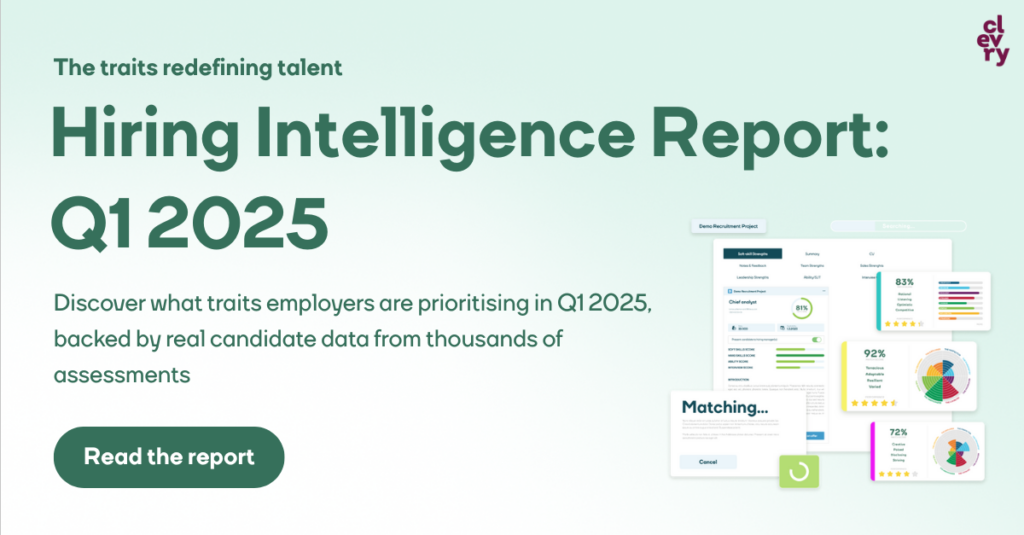For many businesses hiring new employees, certain traits aren’t just preferred—they’re essential.
The latest data from our Hiring Intelligence Report Q1 2025 (HIRE), shows the top five traits consistently used in assessments across industries: Listening, Adaptable, Stress Management, Calm, and Resilient. While none of these are technical skills, each is being treated as a critical predictor of workplace value.
So what do these five tell us about the direction hiring is heading—and why are they currently so popular?

1. Listening: Still the anchor of team dynamics
Listening has ranked number one in our assessments for many quarters (excluding Q4 of 2024 where it briefly dropped into 2nd place). And it’s not about politeness—it’s about signal processing in high-stakes environments.
People who listen well reduce friction in teams, absorb complex information faster, and contribute to smoother decision-making. Listening is increasingly treated as a marker of low ego, situational awareness, and collaborative potential.
2. Adaptable: Flexibility minus chaos
Adaptable sits firmly in second position. This doesn’t mean being a pushover or shapeshifter—it points to interpersonal fluidity: how people adjust their communication style across different contexts and with different people.
Hiring teams are looking for individuals who can read a room, shift gears smoothly, and avoid the kind of rigid behaviour that slows down group cohesion or customer experience.
3. Stress Management: No longer optional
Stress Management made a sharp jump this quarter—from 7th to 3rd. That movement signals a recalibration in hiring focus: employers aren’t just asking “Can they do the job?” but “Can they keep performing when the pressure spikes?”
This is especially relevant in hybrid and remote environments where autonomy is high but emotional support is low. Those who can self-regulate under deadlines are seen as scalable hires—less oversight required, lower volatility risk.
4. Calm: The unseen advantage
Often underestimated, Calm holds steady in 4th place. It reflects how easily someone gets flustered or overwhelmed—not in catastrophic situations, but in the everyday buildup of task-switching, micro-deadlines, and unclear instructions.
When paired with Stress Management, Calm becomes part of an emotional baseline: stable hires who don’t add noise to already complex systems.
5. Resilient: Grit, reframed
Rounding out the Power Five is Resilient, a trait that speaks to emotional recovery. It’s not about pretending nothing affects you—it’s about how quickly someone returns to centre after feedback, friction, or failure.
Resilience is the trait of long-game contributors. These are the people who can weather internal politics, bounce back after project collapse, and stay focused even when recognition is delayed.
Why these five?
What unites these traits isn’t style or charisma—it’s stability under pressure. In a time of overstretched teams, economic uncertainty, and evolving workflows, the demand isn’t for louder personalities or visionary thinkers. It’s for people who can hold their ground.
These five traits serve as risk filters. They help employers identify candidates who won’t destabilise teams, drain energy, or require emotional babysitting.
What this means for hiring teams
- Interviews should stress-test behaviour, not just probe for experience.
- Assessments need to move beyond ‘cultural fit’ and towards composure, flexibility, and tolerance thresholds.
- Development plans should start with emotional stability before leadership potential.
Hiring isn’t just about who can shine—it’s about who can sustain. And the Power Five are the clearest indicators of that trend yet.




